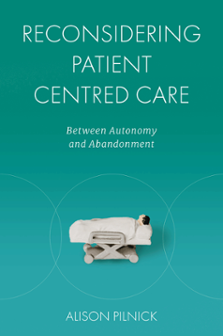Abandonment
, 4, 23, 65–67, 85, 99–107, 115, 121
Activity contamination
, 47
Activity-passivity model
, 9
Advice giver category
, 73–75, 84, 87
Advice giving
, 33, 72–73, 75, 84
Affirmative care
, 107, 108, 114
Agency, patient or client
, 20–21, 29, 35, 79–81, 88–89, 116, 130
Agenda setting, patient or client led
, 51–55, 84
Amniocentesis
, 64, 69, 103
Antimicrobial resistance
, 43–46, 61
Asymmetry, in doctor patient encounter
, 8, 20, 24, 72, 89, 90–91, 98, 121, 123, 125
Auspicious interpretation
, 69–70, 75, 104
Authority
deontic
, 85, 92–94, 97, 99, 101, 102, 105–106, 121, 125
epistemic
, 85, 93, 94, 97, 99, 101, 104, 121, 125
Autonomy
, 10, 99–107
and individual choice
, 7, 21–22, 24–25, 37, 42, 46, 51, 85, 113–115
limits of
, 115–117
and professionalism
, 22–23
rise of
, 20–21
Autonomy, patient
, 7, 10, 20–23, 65, 67, 115–116, 118
Autonomy, relational
, 22, 42, 59, 115–116
Capacity, for self-determination
, 21, 24, 35, 38, 108, 116
Checklist-based approaches
, 4, 18, 20, 27, 35, 51, 58, 67, 76, 111, 117–118, 124–125
Choice, as an ideological device
, 118
Choice, consumer
, 24, 113–115, 118
Choice, individual
, 7, 21–22, 24–25, 37, 42, 46, 51, 85, 113–115
Choice, patient
, 15, 22, 35, 45, 58, 61, 83, 92, 105, 113–115
Choice in context
, 117–119
Choice-centred conceptualisation of medicine
, 85
Chronic illness
, 9, 72, 86, 97–99
Chronic illness context, expertise in
, 97–99
Client-led agenda setting
, 51–55
Clinical judgement
, 100–101
Clinical practice guidelines
, 115–116
Co-design, of services and care pathways
, 122
Code and count tradition
, 11
Communication
impairments
, 76
problem of communication in healthcare
, 41–42
skills training
, 33, 49, 76, 112
Complicity of social science
, 119–122
Conflict
limitations of training as solution to interactional conflict in healthcare
, 83–84
problem of managing conflicting moral norms in interaction
, 76–83
Constituting expertise in interaction
, 94–97
Consumer choice, limitations as applied to healthcare
, 113–115
Consumerism
, 5, 14, 24, 108, 112, 113, 114, 122
Consumerist models of medicine
, 114
Context, expertise in
, 117–119
Control, of healthcare interactions
, 12, 16, 21, 35–37, 44–46, 54, 61, 63, 67, 68, 83, 88–92
Conversation analysis (CA)
, 27, 101
as method for studying healthcare interactions
, 28–33
research in primary care
, 91
specific contribution of
, 123–125
Decision making, bilateral
, 106
Decision making, distributed
, 119
Decision making, shared
, 3, 7, 15–20, 35, 46, 59, 67, 92, 101, 104, 106, 111, 118, 123
Decision making, unilateral
, 106
Deontic authority
, 85, 92–94, 97, 99, 101, 102, 105–106, 121, 125
Diagnosis/treatment-oriented interaction
, 14
Doctor–patient interaction
, 28, 31, 50, 88–92, 117
Doctor–patient relationship
, 3, 8, 9, 12, 19, 31, 36, 57, 90, 118–120
Dominance, interactional
, 89, 90–91
Double bind, for professionals
, 89–90, 107
Double bind, for patients
, 89–90, 106
Imperatives, moral
, 76, 82
Imperatives, organizational
, 2, 4, 27, 34–35, 41, 42, 46
Interactional conflict in healthcare
, 4, 83–84
Interactional difficulty of non-directiveness
, 62–68
Interactional dominance
, 89, 91
Interactional dysfunctions
, 47, 58–59, 71
Interactional norms
, 4, 30, 50, 61, 70, 71, 73, 75, 83, 84, 124
Interactional submission
, 91
International Alliance of Patient Organisations
, 12
Parsons, Talcott
, 8, 20, 29, 31, 57, 86–87, 98, 111, 115
Passivity, patient
, 9, 58
Paternalism
, 11, 58, 62, 92, 97, 99, 117, 125
Patient troubles telling
, 73–75
Patient affirmation
, 85, 107–109
Patient autonomy
, 7, 10, 20–23, 65, 67, 115–116
Patient centred care (PCC)
and the complicity of social science
, 119–122
conversation analysis as method for studying
, 28–33
difficulties of distinguishing between good and bad practice
, 58–59
evidence for effectiveness of
, 14–16
and good organisational reasons for bad healthcare practice
, 34–35
and limitations of consumer choice as applied to healthcare
, 113–115
and limits of autonomy
, 115–117
person centred care vs.
, 23–26
pervasiveness of
, 26
shared decision-making and
, 16–20
Patient centred medicine (PCM)
, 2, 10–12, 16, 23, 78, 101, 111, 123
Patient Centred Outcomes Research Institute
, 13
Patient engagement
, 67, 118
Patient-centredness
, 11, 14, 125
Patient-led agenda setting
, 51–55
Patient-oriented medicine
, 8, 117, 119, 122
Person centred care
, 1, 2, 7, 13, 23–26
Person-centred interaction
, 62
Professional autonomy
, 115
Professionalism
, 86–87, 106
autonomy and
, 22–23
Psychotherapy
, 24, 33, 62–63, 93, 109, 117
Sacks, Harvey
, 29, 73, 75
Shared decision making (SDM)
, 3, 7, 15–20, 35, 46, 59, 67, 92, 101, 104, 106, 111, 118, 123
Sick role model
, 8, 22, 46, 57, 98, 115
Smoking cessation
, 55, 57, 61, 74
Social science, complicity of
, 119–122
Sociology in medicine
, 5, 120
Sociology of medicine
, 5, 119
Sociology of professions
, 87
Structural functionalism
, 29
Struggle for control
, 4, 16, 21, 85, 88–92, 108
